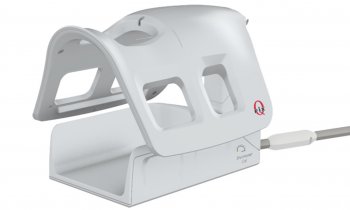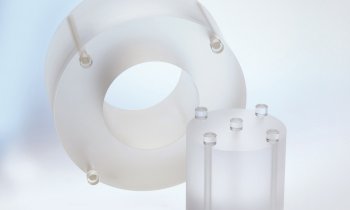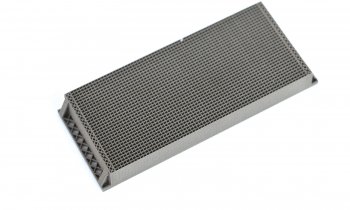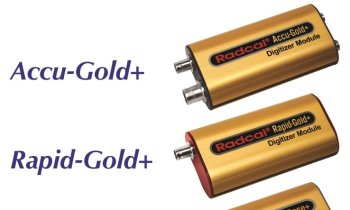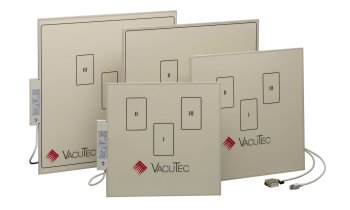Article • Benefits of seated placement
Patient positioning during cancer radiotherapy: Upright is alright
The concept of delivering radiation therapy to cancer patients seated in an upright position is undergoing a major resurgence. Evidence is already highlighting that patients feel more comfortable seated upright and enjoy better communication with radiotherapists during their care. In addition, there are indications of less internal organ movement, enabling more accurate treatment delivery. Manufacturers also point to upright systems taking up significantly less space by removing the need for a gantry (particularly evident in proton therapy) and being more cost-effective.
By Mark Nicholls
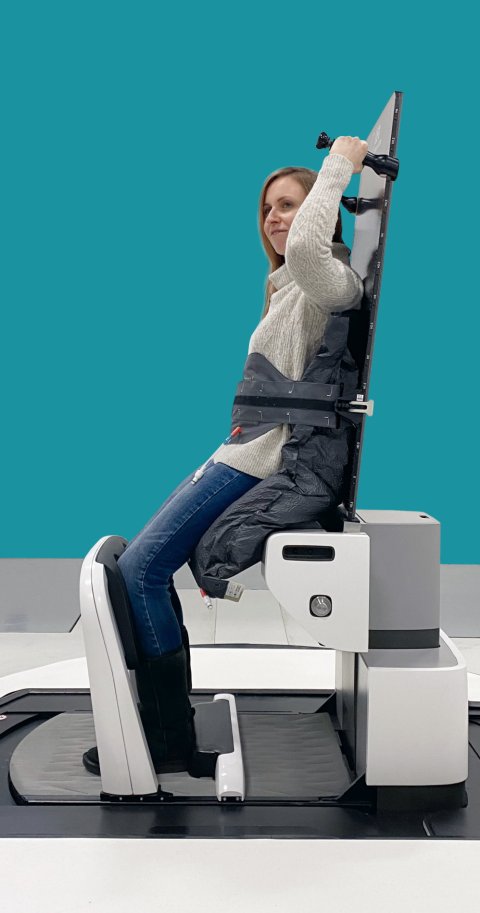
© Leo Cancer Care
Upright technology brings a new dimension to cancer treatment by keeping the radiation beam fixed and slowly rotating the patient through it while seated in an upright position. Delegates to the recent ESTRO (European Society for Radiotherapy and Oncology) trade event in Glasgow heard the advances – and challenges – in the field, while a satellite consortium meeting organised by upright systems manufacturer Leo Cancer Care also attracted considerable interest with speakers and delegates from across the globe.
While not a new technique, upright radiotherapy is enjoying a revival and becoming a hot topic. Dr Ye Zhang from PSI in Switzerland told the ESTRO session that the ‘potential for upright treatment is significant’ in terms of reduced cost and clinical benefits.
Meanwhile, Dr Lennart Volz from the Department of Biophysics at the GSI Helmholtz Centre for Heavy Ion Research in Germany noted that several industry vendors are developing cost-efficient upright imaging systems. But he warned: ‘While upright radiotherapy has a lot of potential, many challenges remain. The most crucial challenge is that we need more data and evidence to support the different decisions that have to be taken for upright radiotherapy.’
Reduced setup time, greater patient comfort
(CLB) in Lyon, France. This academic institution dedicated to cancer care, research and education, has conducted research with Leo Cancer Care’s equipment and recently announced it will install one of the company’s patient positioning systems to treat cancer patients.

A CLB study has suggested that patients prefer the upright posture while receiving radiation therapy, that organs move less during the treatment and that setup time is reduced. Boisbouvier said: ‘Patients seem more comfortable and more satisfied in the upright position than the supine position.’
Leo Cancer Care CEO Stephen Towe said: ‘The centre has been instrumental in gathering the research data that has really validated the use of upright therapy clinically.’
The ESTRO session also heard Thomas Bortfeld from Massachusetts General Hospital discuss treatment concepts facilitated by upright radiotherapy, while Mark Pankuch from Northwestern Medicine Proton Center in Chicago told how his centre has treated almost 700 patients on an upright system.
510k clearance paves way for mainstream success
Leo Cancer Care presented its upright technology, which has seen installations across several centres on both sides of the Atlantic. The underlying Marie concept – named after Nobel laureate and radiology pioneer Marie Curie – combines a CT scanner with an upright patient positioning system. Its positioning system recently gained 510k regulatory approval in the United States for clinical use, with a similar process under way in Europe.

UW Health in Madison-Wisconsin and McLaren Health in Michigan have begun installing the system while in Europe, CLB is being followed by the National Center for Oncological Hadrontherapy (CNAO) in Pavia, Italy, which will use the upright approach to deliver proton and carbon ion radiation therapy.
Medical physicist Thomas ‘Rock’ Mackie is co-founder and Board Chair of Leo Cancer Care, and particularly thrilled with the 510k approval. Upright, he explained, allows for better patient positioning in a relaxed and natural posture and is gaining traction across healthcare, pointing to the response at ESTRO 2024. ‘I think upright is going to become mainstream,’ he said.
In welcoming the 510k ruling, Towe added: ‘This regulatory clearance marks a turning point for the company. The technology will now go from a non-clinical research solution to a fully functioning clinical device.’
Implementation in the NHS
In the UK, the charity Macmillan Cancer Support has announced a strategic investment of an undisclosed amount in the company and hopes that the funding will also pave the way for the upright care option to become available through the NHS.
Professor Richard Simcock, Chief Medical Officer at Macmillan, said: ‘Moving the patient into an upright position can create a more positive experience. It can help them feel more in control, which can reduce the anxiety they might feel lying down, and it’s reassuring for them to be able to see their healthcare professional.’
The Academic Health Science Network (AHSN), NHS England’s network of innovation agencies, has also highlighted the value of upright technology. Notably, the Kent Surrey Sussex AHSN conducted an in-depth cost-benefit analysis into Leo Cancer Care’s upright solution to deliver Proton Beam Therapy (PBT) to treat cancer, finding that it could lower costs and waiting list backlogs in the NHS.
Experts acknowledge there are still challenges with upright radiotherapy solutions, there are advantages and potential benefits, but there is optimism and enthusiasm within the sector that such technology is destined to have a key role in cancer care in the not-too-distant future.
Profiles:
Stephen Towe is the Chief Executive Officer and Co-Founder of Leo Cancer Care and since taking on the role in 2018 has led the company’s global expansion. With a track record of delivering innovative products in radiotherapy, Towe has built a career innovating and commercialising radiotherapy products and thrives on challenging the norm and improving the quality of care.
Thomas ‘Rock’ Mackie is the Board Chairman and Co-Founder of Leo Cancer Care and also Professor Emeritus of Medical Physics and Human Oncology at the University of Wisconsin-Madison. During 25 years at Wisconsin-Madison he co-founded a number of innovative healthcare companies, including the Geometrics Corporation to develop the Pinnacle Radiotherapy Treatment Planning System (TPS) and TomoTherapy to create an image-guided intensity modulated radiotherapy system before taking a role with Leo Cancer Care. He is a recipient of the Gold Medal of the American Society for Radiation Oncology (ASTRO) and the Coolidge Gold Medal of the American Association of Physicists in Medicine (AAPM).
18.06.2024






